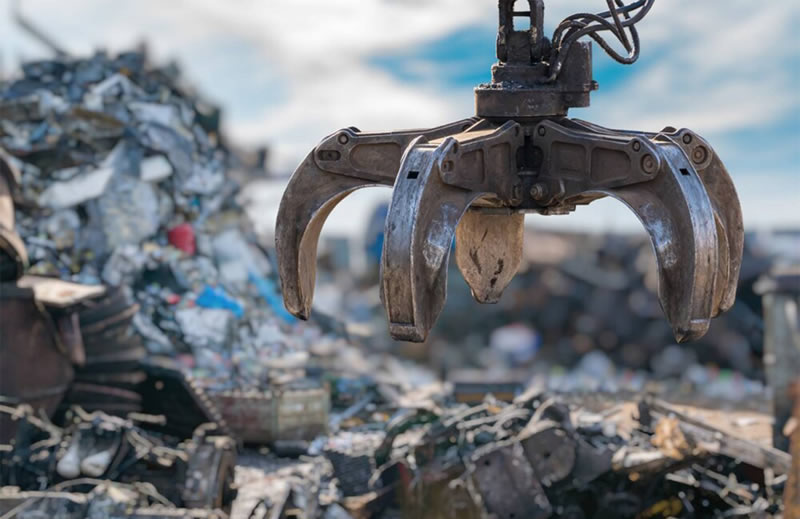
SEP 13, 2023
The Uses of Recyclable Aluminum
Scrap metal recycling is instrumental in conserving resources while mitigating environmental impact. Here RCM Recycling delves deeper into its multiple benefits and applications, emphasizing how scrap buyers/companies contribute towards creating a more sustainable future.
Aluminum: Recyclable Material for Economic Success
Aluminum has become one of the key elements in environmental sustainability thanks to its abundance and advantageous qualities that make it suitable for recycling:
- Endless Recyclability: One of the hallmarks of aluminum's impressive qualities is its inexhaustible recyclability. While other materials degrade during recycling processes, aluminum remains durable enough for continuous recycling without loss in quality or performance - an outstanding example of a circular economy where resources are preserved while waste is reduced.
- Energy Efficiency: Recycling aluminum requires significantly less energy than producing it from raw materials, with recycled aluminum using up to 95% less energy than its virgin equivalent, leading to huge energy savings that reduce energy usage and greenhouse gas emissions.
- Resource Conservation: By recycling aluminum, we reduce demand for bauxite - the ore used to produce it - which helps preserve natural landscapes, reduces habitat disruptions, and lessens environmental effects from mining operations.
Recycled Aluminum Applications and Advantages of Recycling Aluminum
Recyclable aluminum has numerous uses across industries, showcasing its adaptability and eco-friendliness:
- Automotive Industry: Recycled aluminum is a favorite material among car manufacturers due to its lightweight properties that increase fuel efficiency while decreasing emissions. Many engine components and body panels are made out of recycled aluminum.
- Packaging: Aluminum's resistance to corrosion and ability to block light, oxygen, and moisture makes it the ideal material for packaging products like cans, foils, and containers, which save considerable energy with their recycling efforts.
- Construction: Recyclable aluminum has long been employed in the construction industry as an economical material for doors, windows, and structural components such as doors and frames.
- Aerospace: When it comes to aerospace manufacturing, every ounce counts. Recyclable aluminum's lightweight yet strong properties make it indispensable in producing aircraft components that increase fuel efficiency while decreasing carbon emissions.
- Consumer Electronics: Laptops, smartphones, and tablets often incorporate aluminum casings for their lightweight yet sturdy and heat-conducting properties that protect electronic components while reducing weight. Recyclable aluminum has also proven useful in airplane construction projects due to its superior insulation properties that protect electronic components while decreasing overall weight.
Recycling of Scrap Metal Reducing the Environmental Footprint of Scrap Recycling
Recycling scrap metal is essential to sustainable aluminum usage, with buyers and companies playing an essential part in this process. Here is how:
- Collection and Sorting: Scrap metal buyers play an essential role in diverting aluminum scrap from landfills by collecting it from various sources such as manufacturing facilities, construction sites, consumer recycling centers, etc. This step must be noticed!
- Processing and Refining: Scrap metal companies process and refine collected aluminum scrap to remove impurities and prepare it for reuse, such as melting, purifying, and shaping it into useable forms such as ingots or sheets.
- Supplying Manufacturers: Once recycled aluminum has been refined and sold to manufacturers for production, it saves resources and energy by cutting down on virgin production needs. In essence, recycling aluminum reduces virgin aluminum needs drastically!
- Economic Advantages of Scrap Metal Recycling: Scrap metal recycling also has an array of economic advantages. It creates employment opportunities while stimulating local economies - creating a win-win solution that benefits both communities and the environment.
Scrap Metal Recycling Brings Environmental Benefits to Our Community
Aluminum recycling offers significant environmental advantages; in particular, recycling aluminum metal waste provides lasting ecological gains.
- Conservation of Natural Resources: Aluminum is made up of bauxite, which requires extensive mining and refining processes; by recycling aluminum, we reduce these resource-intensive activities while conserving natural environments.
- Landfill Diversion: Aluminum waste can take centuries to decompose in landfills if left discarded. Hence, recycling ensures aluminum waste is diverted from these facilities, saving precious landfill space while decreasing associated environmental risks.
- Air and Water Pollution Reduction: Extraction and processing of bauxite can contribute significantly to environmental contamination; switching to recycled aluminum can lower the demand for polluting activities that contribute further.
RCM Recycling
RCM Recycling is dedicated to making an environmental difference by responsibly recycling recyclable aluminum scrap. With state-of-the-art facilities and an experienced team, aluminum is collected quickly, processed efficiently, and returned into production cycles quickly.

